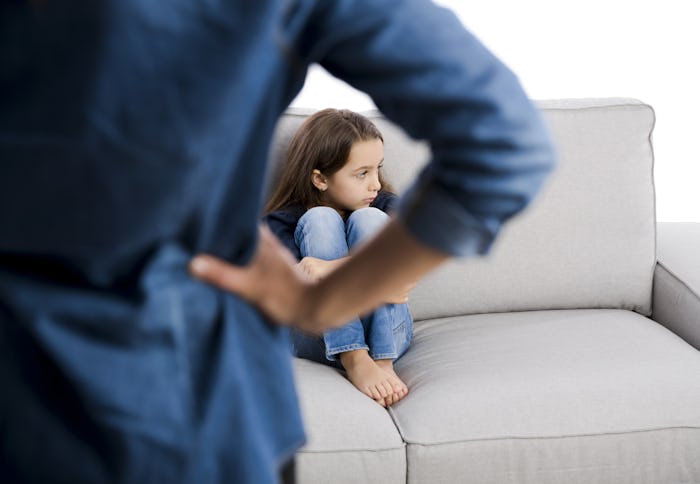Learning how to parent in a way that's beneficial to your unique child isn't easy. Thankfully, learning about the four main attachment styles in kids — secure, ambivalent, avoidant, and disorganized — can help you figure out what's best. I've just recognized the attachment styles of my own children, and I can tell you that it's made all the difference. For example, while my son has a secure attachment style, my daughter has an avoidance one. In fact, there are signs your kid has the avoidant attachment style that can help you tailor your parenting style to your kid's specific needs, like I've had to do with my daughter.
I never knew much about parenting styles when my kids were babies. In fact, in those newborn days I think my entire style was simply "survive." But now that my kids are older and becoming their own people with their own likes, dislikes, and unique personalities, it's becoming increasingly obvious that I can't parent them entirely in the same way. I can be consistent, to be sure, but what works for one kid doesn't always work for the other. I have had to adjust, and be flexible, for the sake of both my children.
That has taken some work on my part, especially when it comes to researching and familiarizing myself with the different attachment styles in children. And since I've realized that my daughter has the avoidant attachment style — which, according to GoodTherapy.org, means a child "often fails to cry when separated from the parent, avoids and ignores the parent when reunited (by moving away, turning away, or leaning out of arms if picked up), and shows little or no proximity or contact-seeking, no distress or anger at separations" — I've had to adjust and rethink my entire parenting philosophy. Welcome to motherhood, my friends.
So if you, like me, are wondering how to best parent your child and think you might have to adjust your game plan, here are some signs your child has the avoidance attachment style... so you can go about parenting them to the best of your ability:
They Act Like They Don't Your Help
My daughter keeps to herself and rarely tells me when she needs something, even if it's something I'm supposed to give her. At least every other day she will tell me she doesn't need my help, and is adamant about doing it all on her own.
They Focus On Their Toys
According to GoodTherapy.org, a child with an avoidant attachment will "focus more on toys and the environment than on a caregiver in new and strange situations." So, for example, if you drop your kid off at a new daycare and they immediately focus on the toys the daycare provides, and seems unfazed by their new caregivers or the fact that you won't be there, they probably lean towards this particular type of attachment method.
They're Not Emotional
There are moments when I swear my child is devoid of all emotions. She's not, of course, but she sure does keep her feelings close to the chest. According toGoodTherapy.org, when a child has an avoidant attachment style, their "responses to the parent often appear unemotional."
They Don't Cry
If your child appears to be unemotional, then chances are they rarely, if ever, cry. According to PsychAlive, a child with an avoidant attachment style will try to refrain from crying, especially around their parent and/or caregiver.
They Resist Physical Contact
While my son is what one would describe as a cuddle bug, my daughter would rather not be touched. According to PsychAlive, a baby or young child that actively resists physical contact with their parent just might be leaning towards that avoidant attachment style.
They're Independent
According to Psychology Today, kids with avoidant attachment style show early signs of independence, and are often self-reliant. Is that a bad thing? Of course not. I mean, our entire goal, as parents, is to raise self-sufficient and independent children. But I also want my daughter to know that she can rely on me, and others, instead of only herself.
If these aforementioned signs describe your child, that doesn't necessarily mean your child has the same attachment style as mine. There's overlap in attachment styles, and no two kids are alike. But by understanding the key differences in each attachment style, and child — as well as how you, as a parent, have contribute to them and may be able to adjust now that you are aware of them — your relationship with your child can change for the better.
At least, that's what I hope for when it comes to my daughter.
